#faramir captain of gondor
Explore tagged Tumblr posts
Text

#lotr#lord of the rings#lotr memes#lotr meme#lord of the rings memes#lord of the rings meme#lord of the rings post#lotr post#aragorn#meme#denethor#boromir#faramir#denethor meme#boromir meme#faramir meme#faramir captain of gondor#lotr trilogy memes#lotr trilogy meme#the fellowship of the ring memes#the fellowship of the ring#the two towers meme#the two towers#the return of the king memes#the return of the king
188 notes
·
View notes
Text
Boromir the mansplaining Chad
Now I'm no Boromir hater, I often defend him from accusations of being a "bad guy". But he's weirdly the most commonplace in our world kind of man in Tolkien's work. He has a good heart but boy does his attitude reek of entitlement in many places. He lacks the humility to truly listen even when the wisest in Middle Earth are speaking. He seeks to push his will and if he can't reason his way into making people do what he'd like he attempts manipulation by pouting a bit "if that hasn't earned some payment then I'll go back to Minas Tirith alone." The whole trip he pushes for the ring to go to Minas Tirith no matter how much others caution him. He misses the cues to drop the topic and keeps trying to force his will upon the company. It smacks of a man trying to convince a woman to go out with him and he just ignores the cringes, the polite answers, the her removing herself from proximity, the gentle nos and when he's given a resounding no he loses his temper and gets borderline violent.
I don't think it's any coincidence that the real time seduction of the Ring on a member of the Race of Man is happening with a man who is in every way so commonplace to the men of reality. Tolkien had served in war, he'd seen the varieties of masculinity in all their shapes sizes and personalities. Who can say how many "noble fighting men" like Boromir he'd seen lose their lives some plausibly due to hubris as much as enemy missiles. Boromir is a good man but more accurately he is the perfect representation of a privileged man of our times trying to perform masculinity versus the Aragorns and Faramirs who possess the quiet confidence that they don't require thanks, submission, repayment, or accolades. The "blood of the men of Westernesse" feels like Tolkien's code for "less likely to be an entitled dick" when it comes to the trilogy.
But Boromir in spite of his flaws is still a good man, he's just a mega Chad and that needs to be acknowledged too.
#tolkien#jrr tolkien#lord of the rings#lotr#gandalf#council of elrond#elrond#boromir#captains of gondor#captain of gondor#gondor#aragorn#men of Westernesse#numenor#blood of numenor#numenorean#denethor#faramir
51 notes
·
View notes
Text
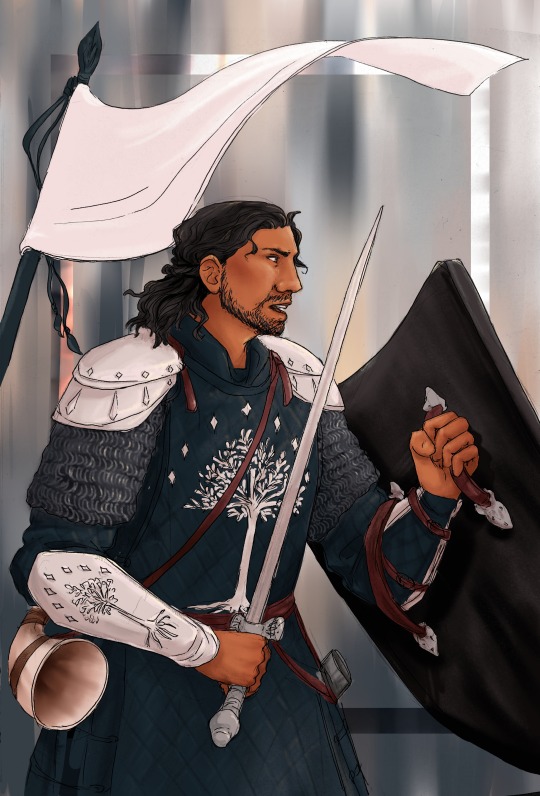

*pops up from an irregularly scheduled lotr reread with blood in my teeth* your honor i simply care so much about him
(lagoon nebula photo by judy schmidt, whose astrophotography is, just, so incredibly cool, and you should check out the rest of her work if you like this kind of thing)
#boromir#the lord of the rings#lotr fanart#tolkien fanart#WOE. CAPTAIN-GENERAL BE UPON YE#*grabs your face in my hands* gondor's been the first line of defense against an active mordor for 20 years culminating in the destruction#of the osgiliath bridge in 3018 of which boromir faramir and 2 other guys are the only survivors. he leaves for rivendell TWO WEEKS later.#this guy has Been Through Some Shit and as i get older i only appreciate him more and more#subcreation#sinome maruvan ar hildinyar
143 notes
·
View notes
Text



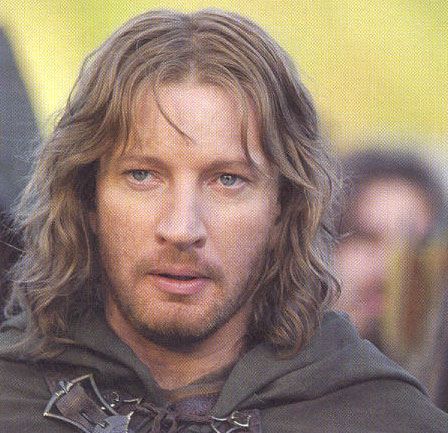
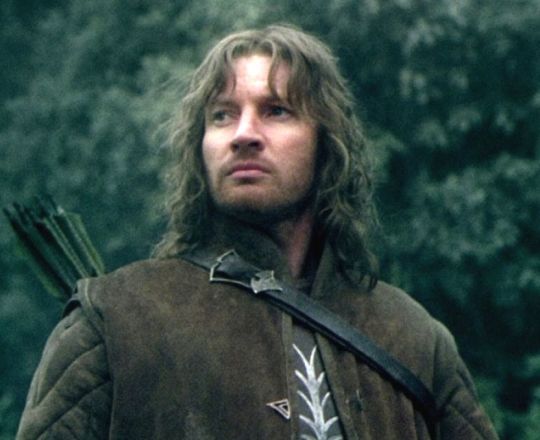

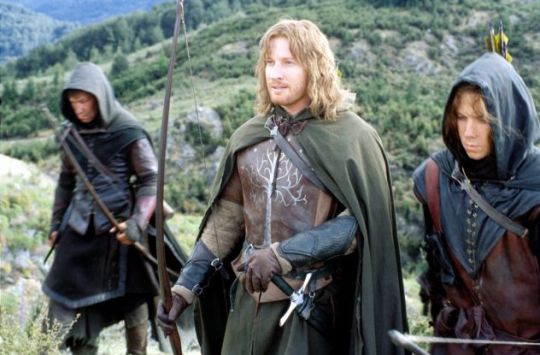
#Faramir#David Wenham#LotR Trilogy#Captain of the Rangers of Ithilien#Steward to the King of Gondor#Lord of Emyn Arnen#Prince of Ithilien
42 notes
·
View notes
Text
The main thing that the Jackson LotR movies are good for is providing a mental database of detailed visuals, so I don't have to imagine absolutely everything, which frees up my brain to fill in all the details of all the amazing scenes that they didn't bother to include in the movies.
#lord of the rings#tolkien#this reread (particularly ttt) has been a long series of 'i can't believe they didn't include this in the movie'#latest offender was everything involving ithilien#i cannot believe we didn't get to watch faramir do his entire 'the ring has come to me with a host of gondor at my command' speech#while sam and frodo freak out#only for faramir to start laughing and all his guys just shrugging it off like 'i guess the captain just had some joke with them'#i've always been mad at how badly the movies portray faramir#but now i can be mad about losing all the details of his chapters
21 notes
·
View notes
Text
'Go back, Faramir, valiant Captain of Gondor, and defend your city while you may, and let me go where my doom takes me.'
"The Lord of the Rings: The Two Towers" - J.R.R. Tolkien
#book quote#lotr#lord of the rings#jrr tolkien#ttt#the two towers#frodo#hobbits#faramir#captain#gondor#dismissal
2 notes
·
View notes
Text








Yet between the brothers there was great love, and had been since childhood, when Boromir was the helper and protector of Faramir. No jealousy or rivalry had arisen between them since, for their father’s favour or for the praise of men. It did not seem possible to Faramir that anyone in Gondor could rival Boromir, heir of Denethor, Captain of the White Tower; and of like mind was Boromir.
#lotredit#lotr#lord of the rings#tolkien#tolkienedit#boromir#boromiredit#faramir#faramiredit#filmedit#paletmblr#giffingpale#**#mine.gif#films#boromir & faramir#1k
1K notes
·
View notes
Text
Bad news everybody I do have to make another post about War of the Rohirrim THERE IS A SCENE! Where Hera corners Helm in the stables just before the battle of Edoras. And she's like FÁTHER I will fight for my people and he's like NAY CHILD do not be absurd etc etc it's like the film's thesis statement (although then it turns out to be vital that Hera was forced to remain in Edoras and her presence there ensures all of the citizens escape safely so... Helm was right to enforce feminine gender roles on his daughter I guess? NEVERMIND, NOT WHAT THE POST IS ABOUT)
WITHIN this discussion HELM SAYS; "One day, you will marry, you will live in Gondor and have children who know nothing of our ways. [-] It would please me [to send you to Gondor] you will be alive because I will have protected you." AND GANG THE LAYERS... THE LAYERS OF INANE RIDICULOUS IMPLICATIONS I-
Fuck Rohan I guess! I suppose based on, idk VIBES, we have decided this country is constantly at war and suffering is a part of it's 'ways' and it's an inherrently unsafe and undesirable place to live and THE BEST WAY TO PROTECT YOUR DAUGHTERS ☝️ IS TO SEND THEM............ TO GONDOR 👉.
You know, fuckiing GONDOR??

GONDOR
This was really the icing on the cake for me in terms of the shallowness of investment in the narratives of these countries. AGAIN, Gondor is also at war right now if you go by book canon, in fact Rohan's war is literally an orchestrated distraction to STOP THEM GOING TO HELP GONDOR! This was a combined and coordinated assault by The Enemy to get around Gondor and Rohan's extremely successful alliance! It's destruction being the main purpose of the conflict!! Even the unending winter was thought to be a sorcerous machination by the enemy!
But no, we are taking Faramir's 'they love war' schpiel entirely at face value, ignoring all actual historical events that contradict him, and Rohan has to be this grim hollywood-stereotype of vaguely nordic warlords who do not value peace, hate prosperity as 'indulgent' and must therefore be constantly imperilled. MEANWHILE Gondor, being 'civilised' but of course also indolent has had a thousand years of peace to laze about and if Hera WERE to marry 'a Gondorian Prince' like, idk, Beregond son of Steward Beren, well! She'd never see war again in her life! I'm sure Beregond's title of 'greatest Captain of war since Steward Boromir' was just like... a vanity thing or something!!! DON'T!!! WORRY ABOUT IT!!!
#text post#wotr critical#the war of the rohirrim#war of the rohirrim#erran vs peter jackson#tolkien#wotr
102 notes
·
View notes
Note
Tbh this is TOTALLY self serving, but I’m currently writing a 1920’s/ 30’s Agatha Christie AU for them and I would LOVE to see something along those lines in your style because everything you draw is stunning and amazing ok thanks I’ll shut up now 💛💛
(long-ish post! Scroll to through the 'read more' to see the fanart!)
I hope you know what you've done,,, this sketch request has single handedly started an obsessed with the concept of a 1930's middle earth eothiriel + Farawyn AU Agatha Christie au,, it has CONSUMED ME you hear me

So I sincerely hope you don't mind that I created a whole au of my own based on this prompt 😅
anyway.,,
Presenting!

With tensions between Gondor and Mordor rising, and war brewing on the horizon, the Steward of Gondor, Lord Denethor, sends his youngest son, Captain Faramir, to Rohan, in hopes of establishing a marriage alliance between the King of Rohan's nephew, Lord Éomer, and his own niece, Princess Lothíriel. Lothíriel, for her part, only agrees to the match if SHE can tag along with Faramir to aid in the marriage negotiations (with the clear intent of sabotaging any real attempts at marriage matching). However, not all is at is it seems in the Capitol of the Riddermark. King Theoden is a shadow of his old self, Lady Éowyn seems to be wasting away into misery, the crown prince is recently dead, and even more strange events keep happening, and the king's advisor Grima Wormtongue seems to be at the center of all of this. When a one of Éowyn's maids is found dead while Faramir and Lothíriel are visiting, it springs into motion a series of events that no one could have predicted. Lothíriel must don her amateur sleuth hat, as she begins to investigate--for not only has a murder occurred, but it appears to be of the supernatural kind...
Below: Lothiriel and Eomer


Above, Eowyn and Faramir!
Anyway, thank you SO much for sending this ask and delighting my brain. I love this au so much!
Also if you ended up posting that fic of yours i'm dying to read it 👀
#lotr#lord of the rings#lord of the rings fanart#lotr fanart#tolkien fanart#the lord of the rings#middle earth#agatha christie au#eothiriel#eomer/lothiriel#eomer of rohan#eomer x lothiriel#farawyn#faramir x eowyn#eowyn of rohan#faramir#my art#also SO SORRY THis took like 6 months for me to get to#if it's worth ANYTHING i've been consumed by the idea of this au for like two weeks straight now lol
100 notes
·
View notes
Text
Tolkien: "I think you misunderstand Faramir."


I think you misunderstand Faramir. He was daunted by his father: not only in the ordinary way of a family with a stern proud father of great force of character, but as a Númenórean before the chief of the one surviving Númenórean state. He was motherless and sisterless (Eowyn was also motherless), and had a 'bossy' brother. He had been accustomed to giving way and not giving his own opinions air, while retaining a power of command among men, such as a man may obtain who is evidently personally courageous and decisive, but also modest, fair-minded and scrupulously just, and very merciful.
I think he understood Eowyn very well. Also to be Prince of Ithilien, the greatest noble after Dol Amroth in the revived Númenórean state of Gondor, soon to be of imperial power and prestige, was not a 'market-garden job' as you term it. Until much had been done by the restored King, the P. of Ithilien would be the resident march-warden of Gondor, in its main eastward outpost - and also would have many duties in rehabilitating the lost the dreadful vale of Minas Ithil (Morgul).
I did not, naturally, go into territory, and clearing it of outlaws and orc-remnants, not to speak of details about the way in which Aragorn, as King of Gondor, would govern the realm. But it was made clear that there was much fighting, and in the earlier years of A.'s reign expeditions against enemies in the East. The chief commanders, under the King, would be Faramir and Imrahil; and one of these would normally remain a military commander at home in the King's absence.
A Númenórean King was monarch, with the power of unquestioned decision in debate; but he governed the realm with the frame of ancient law, of which he was administrator (and interpreter) but not the maker. In all debatable matters of importance domestic, or external, however, even Denethor had a Council, and a least listened to what the Lords of the Fiefs and the Captains of the Forces had to say. Aragorn re-established the Great Council of Gondor, and in that Faramir, who remained by inheritance the Steward (or representative of the King during his absence abroad, or sickness, or between his death and the accession of his heir) would [be] the chief counsellor.
from The Letters of JRR Tolkien, edited by Humphrey Carpenter, letter no. 244, a draft to a critical reader
3K notes
·
View notes
Text



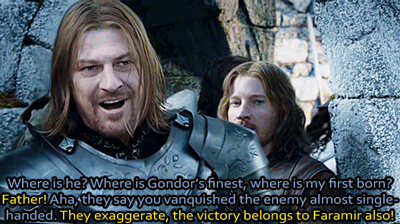



You? Oh, I see. A chance for Faramir, Captain of Gondor, to show his quality. I think not. I trust this mission only to your brother. The one who will not fail me.
Bonus:
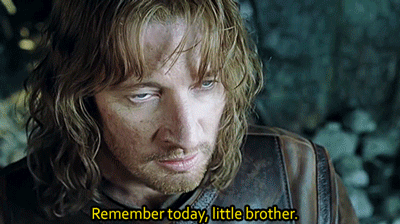
#lotredit#lord of the rings#lotr#the two towers#faramir#boromir#denethor#anni edits#for han! we've been watching extended editions again and we loved this scene#oh don't worry we're DEFINITELY being weird about it. we're cooking xx#prettyboy faramir you are so bae. if it's any comfort to you you are so bae. fk denethor. xx
206 notes
·
View notes
Text
On the one hand, I absolutely love the high tragedy of Denethor's arc in the book, think it's amazingly well-written, and that he is one of the most complex and fascinating characters that Tolkien ever wrote.
On the other, there's part of me that's also a little frustrated by how much it has to happen because Tolkien kind of wrote himself into a corner with the Ruling Stewards. He's insistent on a few things about them:
Their initial rise to power as perma-regents of Gondor was squeaky-clean. Mardil was a paragon of virtue, he tried to prevent Eärnur from getting himself killed, there were no clear successors, and retaining the regency prevented another Kinstrife and created a stable institution that would hold Gondor together for 900+ years after the failure of the kings.
They are a high Númenórean family descended from Elendil, even if they're not formally of the line of Elendil (for unknown reasons, but most likely because they're descended through women).
Denethor is notably very similar to Aragorn, in intellect, wisdom, stature, ability, even appearance. He is a towering and respected figure, and he and his sons are highly popular with their people (even with children).
Denethor's military tactics in the book are very good, and UT says Sauron hoped Denethor would be less prepared than he actually was.
Denethor is proud, unbending, and personally dislikes and distrusts Aragorn. He thinks Gandalf is using him against Sauron for now while planning for Aragorn to take power later (this is filtered through his pride but ... um, is he wrong?).
Faramir, now Denethor's last heir, is a fantastic if reluctant warrior and captain, a super special Númenórean throwback, and a thoughtful, intelligent, and wise person who is humbler than Denethor, but also established as wary about Aragorn.
Gondor formally rejected the claim of Aragorn's family before the Ruling Stewardship even existed.
What all this means is that Denethor, if alive, is someone who will never willingly give way to Aragorn. Denethor has legal precedent on his side, he is himself a perfectly good ruler from a long-standing, stable, legitimate ruling family and a highly capable military leader in war, he is liked by his people, and he even has a viable heir regardless of the personal strain between him and Faramir.
There's just no reason for Aragorn to take power that Denethor, as written, would find remotely persuasive. But Denethor is also too noble and capable and special for a power grab on Aragorn's side to feel right, esp given how destructive it would be in the middle of a war (as Aragorn acknowledges!). Despite the sparkly kingliness and mystical airs, this is fundamentally a dynastic dispute between two different houses descended from Elendil, based on the minutia of Gondorian and Númenórean law and precedent, and a fight over that is ... not the kind of story this is.
Denethor has to be driven to self-destruction by the plot so that Aragorn's rise can happen. It simply would not occur if Denethor was alive and in his right mind. Faramir has to be mystically healed by Aragorn so that his reservations will dissolve and he will voluntarily remove himself from the picture in a way that doesn't feel bad.
And both scenes are fantastic, and make sense for the characters. But I do feel that they kind of get steamrollered by the plot to make way for Aragorn.
The thing that makes that doubly fascinating, though, is that Tolkien didn't have to prop the House of the Stewards up so thoroughly. He could have written a version where the Stewards are inadequate or really sketchy or simply can't be compared to Aragorn's greatness and it's clear why they should be replaced by him and his house. Tolkien could have made this a lot easier for himself! And I do respect the more difficult and nuanced approach Tolkien took with the Stewards by making them genuinely impressive and noble and capable in their own right and not just cardboard-cutouts for Aragorn to kick over.
But, well.
#anghraine babbles#long post#legendarium blogging#legendarium fanwank#húrinionath#denethor#faramir#mardil voronwë#etc#ondonórë blogging
355 notes
·
View notes
Text
Faramir and Eowyn Things that give me feels
Faramir teaching her how to read
Eowyn teaching him the speech of the Rohirrim
Their bilingual babies
Eowyn teaching their children riding before they can walk
Faramir reading to them in the womb
Bedtime stories split between tales of Gondor and songs of the Mark
Faramir making sure they know about their brave uncle Boromir
Eowyn taking them to the tomb of Theoden on a trip to see their uncle in Rohan and telling them of their brave grandfather and of his son Theodred who fell before the war
Eowyn and Faramir making sure their children never feel neglected like they had to
The restoration of Ithilien and cleansing of the Morgul Vale
The chance that maybe by the end of their lives a new fair work had replaced Minas Ithil perhaps a garden since no longer was a tower of guard needed
Faramir outliving Eowyn because he is of almost pure Numenorean descent
Naming works started in her life and finished after her death in her honor
Just all the things that they would achieve together and how beautiful they would make the world and how good of parents they would be.
Also Beregond being the most loyal bodyguard ever and probably part time baby sitter and his wife likely becoming the lady in waiting to Eowyn
#lord of the rings#tolkien#lotr#jrr tolkien#faramir#gondor#eowyn#captain of gondor#jrrt#eowyn of rohan#prince of Ithilien#ithilien#eowyn x faramir#farawyn#faramir x eowyn#Rohan#minas morgul#morgul vale#eomer#eomer of rohan#beregond#Boromir#theoden#i do not desire the speech of living men
147 notes
·
View notes
Text




Faramir, captain of Gondor
#wujczak#miniature painting#wargaming#games workshop#lotrsbg#lotr#mesbg#gondor#lord of the rings#middle earth
80 notes
·
View notes
Text
LOTR Newsletter - September 19
So, what’s happening in the summer before Frodo’s departure?
On June 20th, Sauron attacks Osgiliath; at around the same time, he sends Orcs to attack Thranduil, and Gollum escapes.
From Unfinished Tales, "The Hunt for the Ring":
Now Sauron learning of the capture of Gollum by the chiefs of his enemies was in great haste and fear. Yet all his ordinary spies and emissaries could bring him no tidings. And this was due largely to the vigilance of the Dúnedain and to the treachery of Saruman, whose own servants either waylaid or misled the servants of Sauron. Of this Sauron became aware, but his arm was not yet long enough to reach Saruman in Isengard. Therefore he hid his knowledge of Saruman’s double-dealing and concealed his wrath, biding his time, and preparing for the great war in which he planned to sweep all his enemies into the western sea. At length he resolved that no others would serve him in this case but his mightiest servants, the Ringwraiths, who had no will but his own, being each utterly subservient to the ring that had enslaved him, which Sauron held. Now few could withstand even one of these fell creatures, and (as Sauron deemed) none could withstand them when gathered together under their terrible captain, the Lord of Morgul. Yet this weakness they had for Sauron’s present purpose: so great was the terror that went with them (even invisible and unclad) that their coming forth might soon be perceived and their mission be guessed by the Wise. So it was that Sauron prepared two strokes – in which many after saw the beginnings of the War of the Ring. They were made together. The Orcs assailed the realm of Thranduil, with orders to recapture Gollum; and the Lord of Morgul was sent forth openly to battle against Gondor. These things were done towards the end of June 3018. Thus Sauron tested the strength and preparedness of Denethor, and found them to be more than he had hoped. That troubled him little, since he had used little force in the assault, and his chief purpose was that the coming forth of the Nazgûl should appear only as part of his policy of war against Gondor. Therefore when Osgiliath was taken and the bridge broken Sauron stayed the assault, and the Nazgûl were ordered to begin the search for the Ring.
Elsewhere the same chapter says:
In the panic of the first assault, when the Witch-king was allowed to reveal himself briefly in his full terror, the Nazgûl crossed the bridge at night and dispersed northwards. Without belittling the valour of Gondor, which indeed Sauron found greater far than he had hoped, it is clear that Boromir and Faramir were able to drive back the enemy and destroy the bridge, only because the attack had now served its main purpose.
And here is Boromir's description of the battle from "The Council of Elrond":
“But this very year, in the days of June, sudden war came upon us out of Mordor, and we were swept away. We were outnumbered, for Mordor has allied itself with the Easterlings and cruel Haradrim; but it was not by numbers we were defeated. A power was there that we have not felt before. “Some said that it could be seen, like a great black horseman, a dark shadow under the moon. Wherever he came a madness filled our foes, but fear fell on our boldest, so that horse and man gave way and fled. Only a remnant of our eastern force came back, destroying the last bridge that still stood amid the ruins of Osgiliath. “I was in the company that held the bridge, until it was cast down behind us. Four only were saved by swimming: my brother and myself and two others…. “…on the eve of the sudden assault a dream came to my brother in a troubled sleep; and afterwards a like dream came oft to him again, and once to me. In that dream I thought the eastern sky grew dark and there was a growing thunder, but in the West a pale light lingered, and out of it I heard a voice, remote but clear, crying: [He then describes the riddle/poem Seek for the sword that was broken]”
(Something I hadn't considered before: Who do you think sent the dream? My guess is one of the Valar, probably Irmo (Lórien).)
A little after, on July 4, Boromir sets out for Minas Tirith, though Faramir was clearly preferred by the sender of the dream.
At the end of June, Gandalf has a sense of foreboding, but does not yet know of the attack; this is what causes him to say tell Frodo, "I am going down beyond the southern borders to get some news, if I can." (He has not heard of the escape of Gollum, as he learns that from Gwaihir during his escape from Orthanc.) As he later tells the Council of Elrond:
“At the end of June I was in the Shire, but a cloud of anxiety was on my mind, and I rode to the southern borders of the little land; for I had a foreboding of some danger, still hidden from me but drawing near. There messages reached me telling me of war and defeat in Gondor, and when I heard of the Black Shadow a chill smote my heart. But I found nothing save a few fugitives from the South; yet it seemed to me that on them sat a fear of which they would not speak. I turned then east and north and journeyed along the Greenway; and not far from Bree I came upon a traveller sitting on a bank beside the road with his grazing horse beside him. It was Radagast the Brown...”
Radagast tells Gandalf that the Nine Ringwraiths have crossed to the west side of the Anduin River in secret, as riders in black, and are riding west, and looking for a land called "Shire". He says Gandalf that Saruman says for Gandalf to come to him immediately if he wants help.
Gandalf tells the Council of Elrond:
“I could not follow him then and there. I had ridden very far already that day, and I was as weary as my horse; and I needed to consider matters. I stayed the night in Bree, and decided that I had no time to return to the Shire. Never did I make a greater mistake! “However, I wrote a message to Frodo, and trusted to my friend the innkeeper to send it to him. I rode away at dawn.”
This is one of the most pivotal moments determining how things go in The Lord of the Rings! If Gandalf had taken one day to ride back to the Shire and warn Frodo to depart immediately, or if Butterbur had remembered to send the letter, then Frodo would have set out in early July, not late September, and reached Rivendell by the road before the end of summer, long before the Ringwraiths reached the Shire. Instead, Gandalf reaches Isengard and is taken captive by Saruman on July 10th, and remains captive until September 18th. Gandalf says:
“Fear was ever in my heart for my friends in the Shire; but still I had some hope. I hoped that Frodo had set forth at once, as my letter had urged, and that he had reached Rivendell before the deadly pursuit began. And both my fear and my hope proved ill-founded. For my hope was founded on a fat man in Bree; and my fear was founded on the cunning of Sauron. But fat men who sell ale have many calls to answer; and the power of Sauron is still less than fear makes it. But in the circle of Isengard, trapped and alone, it was not easy to think that the hunters before whom all have fled or fallen would falter in the Shire far away.”
So why did they falter? And if the Ringwraiths were out of Mordor by late June, why did it take them 3 months to get to the Shire? This is one of the big things that "The Hunt for the Ring" explains.
The Ringwraiths did not know where the Shire was! Gollum, obsessed with the Ring, had managed to lie even to Sauron under torture, and pretend that he thought the Shire was in Wilderland (between the Misty Mountains and Mirkwood), in the area of the Gladden Fields where he had dwelt in his youth. The Ringwraiths went there first, and moving in secret, they only got north of Rohan (The Field of Celebrant) by July 22nd, and then spent much of the summer searching further north to the Gladden Fields and beyond. From "The Hunt for the Ring":
Version A About the twenty-second of July they [the six Ringwraiths of Minas Morgul] met their companions, the Nazgûl of Dol Guldur, in the Field of Celebrant. There they learned that Gollum had eluded both the Orcs that recaptured him, and the Elves that pursued him, and had vanished. [Footnote: He had indeed in his terror of the Nazgûl dared to hide in Moria.] They were also told by Khamûl that no dwelling of Halflings could be discovered in the Vales of Anduin, and that the villages of the Stoors by the Gladden had long been deserted. But the Lord of Morgul, seeing no better counsel, determined still to seek northward, hoping maybe to come upon Gollum as well as to discover the Shire. That this would prove to be not far from the hated land of Lórien seemed to him not unlikely, if it was not indeed within the fences of Galadriel. But the power of the White Ring he would not defy, nor enter yet into Lórien. Passing therefore between Lórien and the Mountains the Nine rode ever on into the North; and terror went before them and lingered behind them; but they did not find what they sought nor learn any news that availed them. At length they returned; but the summer was now far waned. Version B The account of the vain journey of the Nazgûl up the Vales of Anduin is much the same in version B as that printed in full above (A), but with the difference that in B the Stoor settlements were not entirely deserted at that time; and such of the Stoors as dwelt there were slain or driven away by the Nazgûl. In all the texts the precise dates are slightly at variance both with each other and with those given in the Tale of Years; these differences are here neglected.
By early September, Sauron is very worried and angry indeed; if he was in a Bond movie or the like, he'd be saying "Why am I surrounded by idiots!?"
The wrath and fear of Sauron was mounting. When they [the Ringwraiths] came back to the Wold September had come; and there they met messengers from Barad-dûr conveying threats from their Master that filled even the Morgul-lord with dismay. For Sauron had now learned of the words of prophecy heard in Gondor, and the going forth of Boromir [July 4], of Saruman’s deeds, and the capture of Gandalf [July 10]. From these things he concluded indeed that neither Saruman nor any other the Wise had possession yet of the Ring, but that Saruman at least knew where it might be hidden. Speed alone would now serve, and secrecy must be abandoned. The Ringwraiths were therefore ordered to go straight to Isengard. They rode through Rohan in haste, and the terror of their passing was so great that many folk fled from the land and went wildly away north and west, believing that war out of the East was coming on the heels of the black horses.
So in short, the Nazgul spent most of July and August on a wild-goose-chase thanks to bad information from Gollum. He's a resilient little guy, you got to give him that.
#lotr newsletter#lotr newsletter spoilers#the lord of the rings#tolkien#gollum#gandalf#boromir#sauron#ringwraiths#unfinished tales
66 notes
·
View notes
Text
The Heart of Gondor

Boromir x female reader
Summary: Set after Boromir's conversation with Aragorn in Lothlorien following the fall of Gandalf. As the 10th walker of the Fellowship and longtime comrade of the Captain of Gondor, you rest with Boromir and share a moment of comfort with him, asking him questions about his childhood - specifically his mother as he rarely spoke of her. Boromir finally opens up about his mother for the first time.
Tags/Warnings: no warnings, just fluff and romance.
———————————
"Tell me, what was she like...your mother?" Your question travels softly to Boromir's ears. Your voice is tender, like a breeze rustling through the leaves of Lothlórien. In the gentle glow of candlelight, your eyes shimmer like pools of earnest curiosity, reflecting the flickering white lights and the deep, ancient sorrow that dwelled within the heart of Boromir.
Boromir sits across from you, the light casting shadows that dance across his rugged features. The shadows seemed to come alive, whispering tales of valor and loss. His hand rests on the hilt of his sword, but his grip is loose, as if the weight of the weapon had become too much to bear, and his thoughts were far from the battlefield. For a moment, the world outside these woods - the ceaseless war, the burdens of leadership - all faded into the background. In this quiet, intimate space, he is merely a man speaking of his past and memories to a woman he secretly adores.
"She was…" Boromir began, his voice rough with the echoes of old grief, "a woman of grace and strength. Her name was Finduilas, and she was the heart of our home."
You sit upon a cushion on the forest floor before him and listen with your full attention, as if enraptured. Unbeknownst to you, your presence is soothing; a balm to his calloused soul. You have been his companion on this perilous journey, a steadfast friend who has given him comfort in his darkest moments. Boromir had rarely ever spoken about his mother to you, but your curiosity was both a gentle nudge and a silent invitation to finally open himself to you.
Boromir leaned forward, resting his elbows on his knees, his gaze distant as if he were peering into a mirror of memory. "She was a daughter of the house of Dol Amroth. Her beauty was renowned, but it was not just her appearance that captivated those around her. It was her spirit, her kindness, and her wisdom. She had a grace that went beyond mere physical beauty."
He paused, drawing a deep breath, as if to steady himself against the tide of memories that threatened to overwhelm him. He feels you watching him closely, as if you're sensing the deep well of emotion that lays beneath his stoic exterior.
"In those days," he continued, "our home was full of laughter and light. She would sing to us in the evening, her voice like a melody that lingered in the air long after the last note had faded. She had a way of making even the simplest moments feel like magic. I remember the way she would kneel beside me and Faramir, her hands gently brushing our hair as she told us stories of old."
A smile tugged at the corners of his lips, but it was bittersweet. "She would speak of the stars and the moon, of the ancient forests and the seas. She had a knowledge of things beyond the reach of our young minds, and she shared that with us as if it were the most precious gift."
Boromir pauses to look into your eyes. He sees them shine with empathy and understanding. Boromir is offering not just a recollection of his mother but a piece of his soul, a glimpse into a world that had been lost to him. You reach out, placing a comforting hand over his. Your touch is light and reassuring.
"Tell me more about her," you encourage him softly.
Boromir’s gaze drops to your joined hands, the warmth of your touch grounding him. "She was everything a young boy could ask for in a mother," he said, his voice carrying the weight of both his sorrow and his love. "She wished for us to find happiness and peace. She hoped that we would grow up to be honorable and just, and that we would live our lives filled with purpose."
His eyes grew distant once more, as if he could see his mother's face before him, illuminated by the pale light. "She believed in the goodness of people, even in the darkest of times. I remember her saying that the true measure of a man is not how he faced victory but how he endured adversity."
There was a long silence, filled only by the mournful song of the elves and the gentle rustling of leaves. Your eyes hold steady, your presence a steadying force in the storm of his emotions.
"And your father?" You ask gently, your voice breaking the silence with a note of curiosity and concern. "What is he like?"
Boromir’s expression grew solemn. "My father, Denethor, is a man of great strength and ambition. He is fiercely dedicated to Gondor, to protecting our people. But, true dedication often comes at a cost. He is a ruler, and the weight of his responsibility sometimes...pushes him away from those he loves."
He looks back at you once more, his eyes shadowed with pain. "The relationship between my mother and father was complicated. While they loved each other deeply, the pressures of leadership created a rift between them. My mother tried to bridge the gap, to bring warmth and light into our lives...despite the heavy shadow that loomed over our family."
There was a softness in his gaze as he continued. "Her memory is what keeps Faramir and myself together, though Faramir was much too young when she passed. She reminded us of the beauty in the world, even when my father's prophetic speeches seemed to overshadow everything. Her love was like a beacon in the dark, guiding us through the trials of our lives."
"It sounds like she was a remarkable woman," you say softly. "A true light in the darkness."
Boromir’s eyes meet yours, and for the first time in a long while, he feels a sense of relief, as if he had finally shared a burden that had been too heavy to carry alone. "She was," he agrees quietly. "And her memory continues to guide me, even in the darkest of times."
You continue to sit together in silence, while the lights of Lothlorien cast a cool glow around you. The shadows of the night seem less daunting now, the weight of Boromir's memories lightened by the act of sharing them.
A small, genuine smile touches Boromir's lips as he moves closer to you. "Thank you, my lady," he says.
You blink your eyes at him in confusion. Why should he thank you when you're the one who asked him?
As if answering your unspoken question, Boromir says, "It is a gift to have someone who listens. Given our task in this journey, it is easy to forget the simple comforts of companionship and understanding."
Your knees graze against his as you close the gap between the two of you, taking both of his hands into your own. "I am honored to be here with you, Captain Boromir," you reply. "And I hope to always be your steadfast companion."
Boromir's eyes widen with sudden realization. From this moment, he is confirmed that his romantic feelings of adoration for you is not unrequited, but mutual.
Gazing into your eyes, he feels a spiritual bond is forged—an established connection of shared understanding, empathy, and the quiet strength that comes from knowing and being known.
All that is left now is to seal the bond. Like a flower reaching for the warmth of the sun, Boromir leans into you and presses his lips against yours, his heart blooming in his chest from the feeling. A swarm of emotions swirl within him: joy, curiosity, fear, and excitement. The fear is quickly subdued and overcome with excitement and curiosity once he feels your lips reciprocate his kiss.
The night stretches on, filled with the promise of new beginnings and the echoes of old memories. As the two of you sit together in each other's embrace, the world outside seems a little less daunting, the burdens of your quest momentarily lightened by the simple, profound act of sharing a piece of each others hearts.
#I might continue this one#idk#I need more emotionally vulnerable Boromir#and more stories about his mother#boromir#boromir x reader#boromir x female reader#lotr#lotr fanfic
59 notes
·
View notes